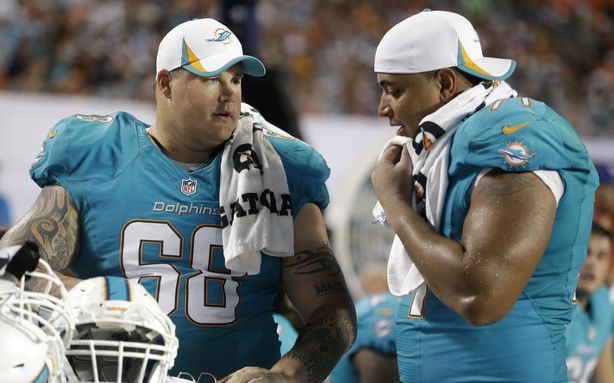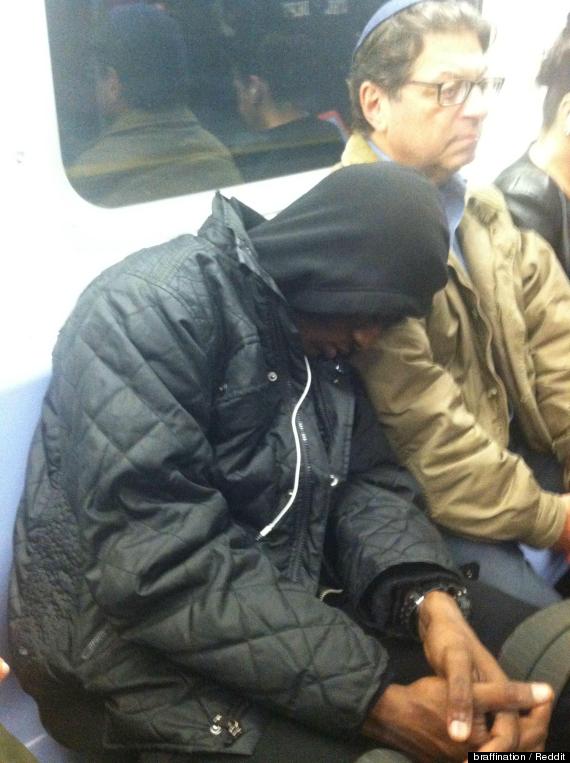
Tom Jones of the Tampa Bay Times asks a great question in the ongoing controversy about hazing/torture in the NFL:
How does a Stanford-educated, 24-year-old man who stands an imposing 6 feet 5, 312 pounds and plays in one of the meanest sporting leagues in the world become so scared of a teammate that he risks ridicule and scorn by walking away from his job as a well-paid professional football player?
The Miami Dolphins’ Richie Incognito took hazing to another level, he says, by doing what he is alleged to have done to teammate Jonathan Martin. He allegedly used racist taunts, shook him down for money, and threatened physical violence. Reports say he did so at the behest of coaches who wanted to toughen up the rookie.
None of Martin’s teammates stood up for him, Jones writes today.
CBS reports this morning that when Martin left the team, he never told his coaches the real reason. He was worried that complaining about being bullied might damage his NFL career and lead to retribution, CBS said.
How does this happen? The need to feel accepted, writes Daily Norseman columnist K.J. Segall, who points out that the Vikings’ Jared Allen is OK with hazing while coach Leslie Frazier is not.
Segall’s column is more personal, however. He writes about the time he underwent hazing in the kickboxing fraternity when he was just 17:
As I crumbled for a second under the worst pain I’d ever experienced (and I fell and dislocated both my hip and shoulder once as a child), suddenly going totally blind, everyone was cracking up. Two people grabbed me by the arms and led me- again, 100% blind- into the ring, where a fighter was waiting (also laughing). The bell began, and he began to “spar” me. I use quotes because he didn’t really hit me. Open hand, soft smacks to the face and body, nothing that would even leave a bruise. I was swinging wildly for my life mind you, but he didn’t care (not like I could actually hit him blind anyways). He just kept laughing and smacking me around for a bit. The bell rang again after what felt like 28 hours (actually 3 minutes) and that was that. I couldn’t breathe, and the tears had washed the spray down onto my shoulders, where I kid you not it was so strong that even there it burned like fire.
Everyone gathered around. Nobody stopped laughing for a good hour. I was told to get on my knees and bend over- the last thing I wanted was for that spray to continue running down my body onto my, ahem, more sensitive areas. And every time I reached to rub my eyes my hand was forcefully snatched and held. Rubbing makes it worse and last longer. But that was the only help I got. For 30 minutes I knelt there, snot and tears covering me, choking and blind. Every passing minute the pain got worse- not better. There was milk to eventually ease it after my half hour of penance was up, and I could hear everyone making chugging sounds and saying that they had decided to drink it instead (which I feared very much was true, but wasn’t). And after 30 minutes I was stood up onto my feet, there was roaring applause, and milk was doused onto my face as someone kept wiping at my stomach to again keep it from running somewhere I really didn’t want. 5 minutes after receiving that magical cure I was better- eyes swollen but once again functioning, still choking up gobs of snot but able to breath steadily. At 17, this Sherriff stuck an open beer out to me. He had double checked with my father and knew it was OK. He told me he imagined I wanted it, and that I would never earn a beer so much again in my life (wasn’t true but whatever). Everyone cracked one open (a very rare thing for fighters), cheered me, and after a swig I was lifted and carried out of the training ring. And from that day forward I was one of them, not a boy amongst men but, in their eyes, a 17 year old man who they would now support, help, and if necessary defend.
It sounds like a horrible story, he notes, but he considers it to this day an “incredible source of pride.” But he’s not sure he could let his own son go through it.
“If drunk college frat bros and direction-following Marines can handle some limitations on their pledge hazing, then the massive men of the NFL can, too,” Eric Lenvenson of The Atlantic writes.
2) THE CURSE OF AFFORDABLE HEALTH CARE
So now the problem is health insurance doesn’t cost enough?
Health insurance premiums via MnSure are so low in many parts of Minnesota that shoppers aren’t qualifying for tax credits to help pay for the insurance coverage, April Todd-Malmlov, the MNsure executive director, told the Pioneer Press.
Related: How Obamacare pays for its subsidies (NPR).
Meanwhile, there was no escaping the issue at last night’s country music awards.
Everybody get off Joe Biden’s and Mayor R.T. Rybak’s back; it can happen to anyone.
VP Biden and the soon-to-be-former Minneapolis mayor, both called the wrong person when attempting to congratulate the new mayor of Boston on Tuesday night, the Cape Cod Times reports. They called Marty Walsh, the former staffer to Sen. Ted Kennedy, and not Marty Walsh, the guy who was just elected mayor of Boston.
“If you need a reservation in the city of Boston, I can probably get you any reservation you want,” the wrong Marty Walsh said.
It happens. Remember this from June 1983?

Ronald Reagan, on a trip to Boston, decided to stop in at the Eire Pub in Dorchester for a beer during a visit to the city. The White House hadn’t told anyone in the media in advance.
I was producing the coverage for a Boston radio station at the time, which was also at a time when Boston was a very competitive radio news market. Our competition was with Reagan and their reporter was in the pub and on one of those newfangled cellphones of the day, reporting live, when he handed the phone to Reagan who was now the exclusive guest of my competition.
There was only one thing to do — call the Eire Pub and get the president of the free world on the phone. An assistant producer did that and got the bartender of the Eire Pub on the phone. The news director ordered me to put him on the air live. So I did.
Our anchorperson gave it a great buildup, noting the president was just then having a brew at the pub, and then introduced the bartender.
“You’ve got the wrong Eire Pub,” he said and our tens of thousands of listeners heard. “You want the one in Dorchester. You’ve got the one in Southie.”
It could be worse, Mr. Vice President and Mr. Mayor.
4) THE MAN WHO ALMOST FORCED THE REDSKINS TO CHANGE THEIR NAME
The Minnesota Vikings host the Washington Redskins and the continued protest over their racist name at the Metrodome tonight.
What does the controversy have to do with Minnesota? A lot, historically, besides the obvious. Stephen Baird, a Minneapolis attorney, led a fight against the name in the ’90s. He won a suit that denied trademark protection to teams with racist names, but it was overturned on appeal and the Supreme Court wouldn’t touch the case.
“It’s interesting for me to look back more than 20 years later and this claim continues to live on,” Baird said. “I think it’s just a matter of time. It’s inevitable that a name change will occur, regardless of what happens in this latest case. But, of course, it would be very gratifying to see justice finally done,” he tells the Minneapolis St. Paul Business Journal.
Deborah Cohen had a dance party this week, just before she went into surgery to have her breasts removed. She’s an Ob/Gyn and this is her medical team in the operating room, according to Huffington Post.
Cohan requested that friends and family make videos of themselves dancing to Bey too so that she could watch them during her recovery. “I have visions of a healing video montage,” she wrote. “Nothing brings me greater joy than catalyzing others to dance, move, be in their bodies. Are you with me people?”
They were. You can check out videos of Deborah’s fans shaking their booties in solidarity on her CaringBridge page.
Bonus I: Locals work hard to bring Saturday’s ‘A Prairie Home Companion’ show to downtown Bemidji (Bemidji Pioneer). Lesson: Always check the calendar to make sure it’s not the beginning of deer season.
Bonus II: “Dear man on the bus, It is never OK to say this to a woman. Or anyone else for that matter.” From this year’s poetry slam in Boston.
Bonus III: A man fell asleep on a New York subway and another man didn’t mind. And now it’s sweeping across Reddit and Facebook as a bit of a reminder to be good. (Huffington Post)
Bonus IV: Report From Rural Maine: What It Takes to Make a School (The Fallows – The Atlantic)
Bonus V: Eden Prairie worries $360,000 homes will let the riffraff in. (Sun Newspapers) h/t: Mpls/StP Business Journal
TODAY’S QUESTION
Should public prayers be allowed during government functions?
WHAT WE’RE DOING
Daily Circuit (9-12 p.m.) – First hour: Factors like lower American energy costs and higher Chinese wages have caused something of a revival in American manufacturing. But experts are divided over whether this is a real renaissance or if it’s just a short-term boom. What would happen to American manufacturing if energy costs here spike? Or if foreign wages plummet? And the question people have been asking for years remains: where are the jobs?
Second hour: There is new evidence about added benefits of the Mediterranean diet on women’s health as they age. A recent study demonstrates that women in their 50s who eat according to the diet – in essence less red meat and dairy, more nuts, berries and fish – have better cognitive functioning as they age. We’ll parse out the elements of the Mediterranean diet to understand why it seems to have these health benefits. We’ll also look- with some skepticism – at all the attention this diet seems to get in the press in an effort to separate diet fad from scientific findings about optimal nutrition.
Third hour: Young women and binge drinking.
MPR News Presents (12-1 pm): Middle East scholar Shibley Telhami, who spoke this week at the University of Minnesota. Author of “The World Through Arab Eyes.”
The Takeaway (1-2 p.m.) – The culture of NFL locker rooms.
All Things Considered (3-6:30 p.m.) – Only about 1 percent of tech entrepreneurs in Silicon Valley are black. Tristan Walker is among them. Born into poverty and raised by a single mom, Walker graduated from Stanford Business School, and then landed a job at a rising tech startup. He did it, but not without struggle. NPR has the story of an African American tech entrepreneur.

